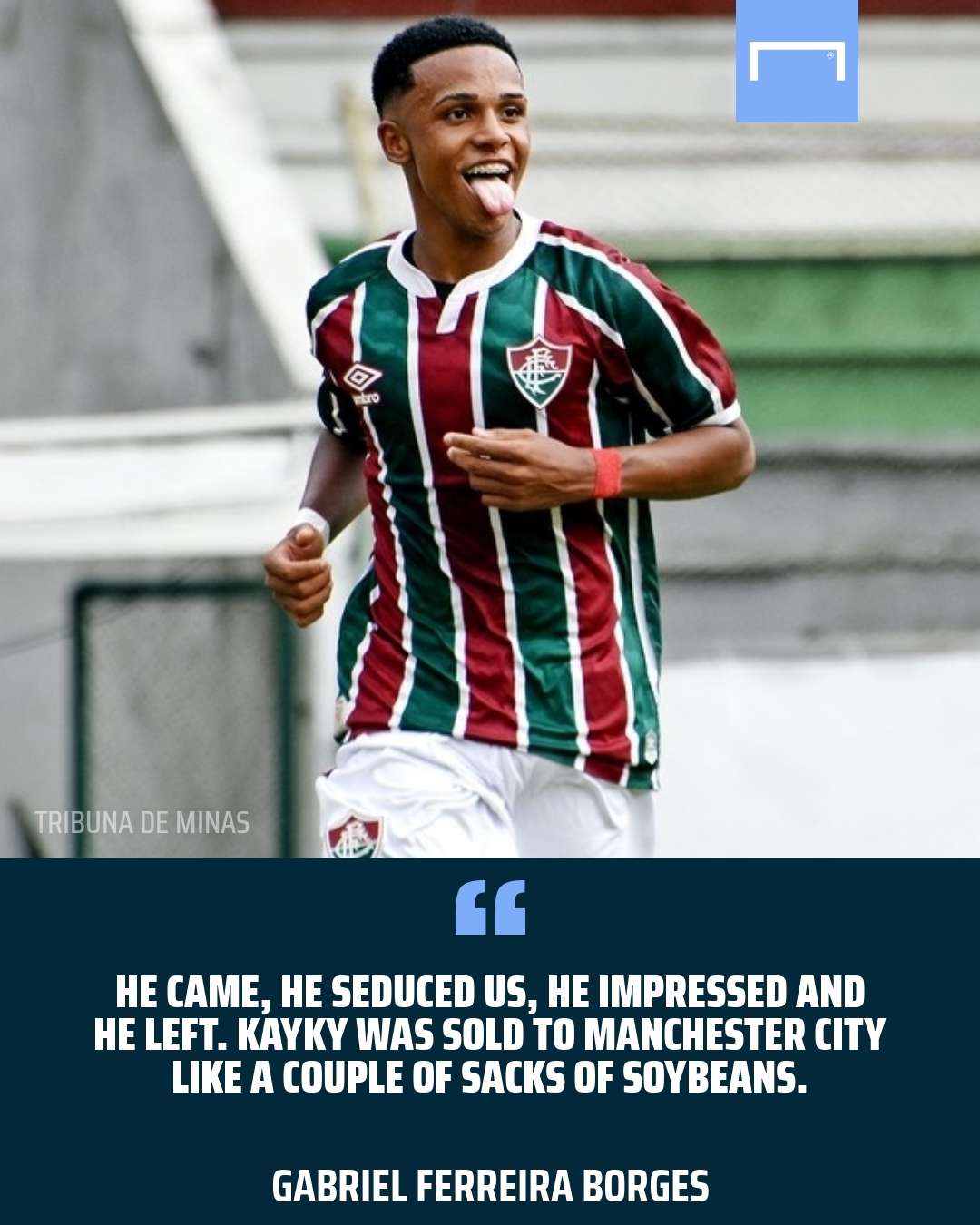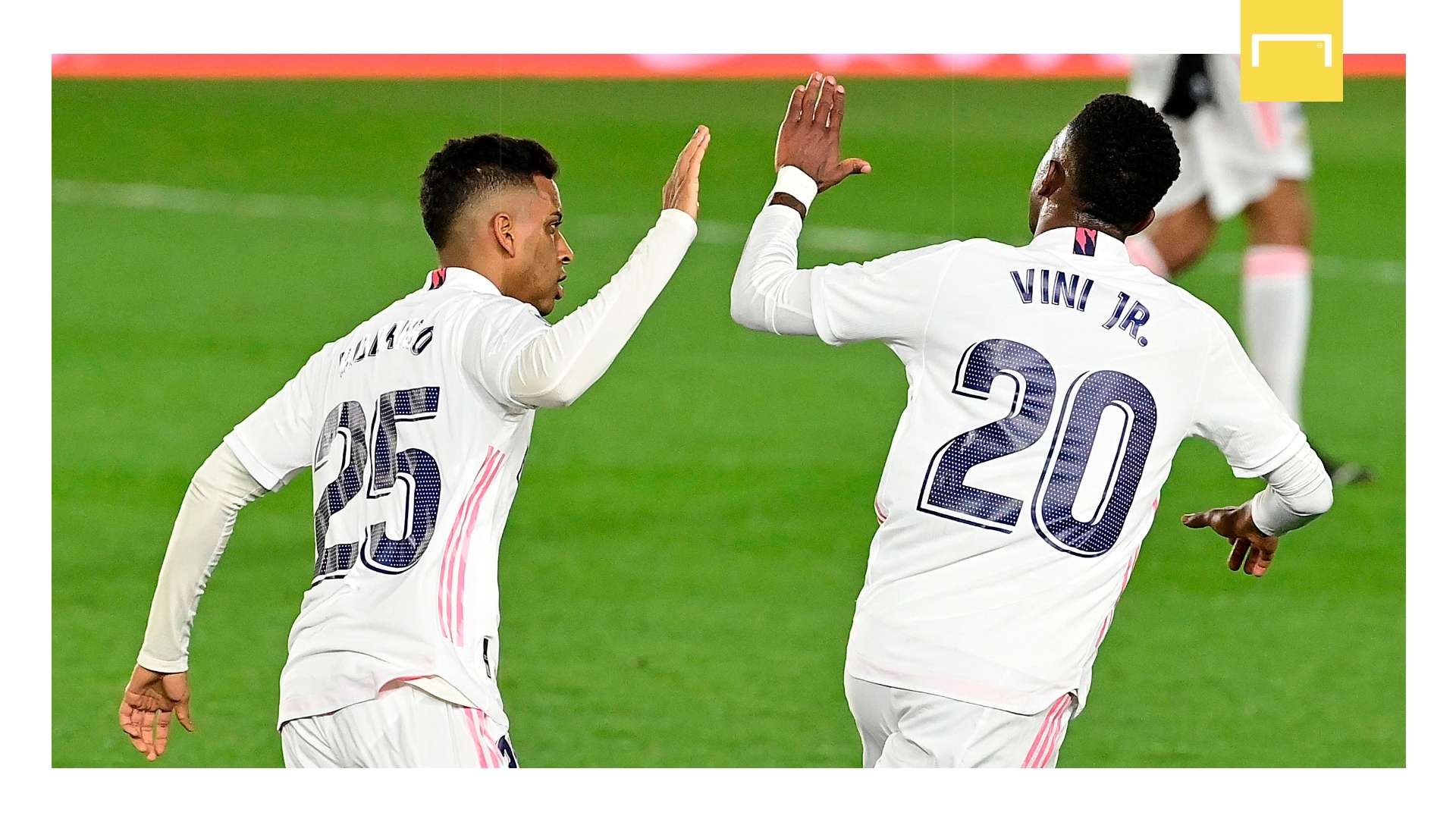Manchester City will soon be welcoming the latest new member of their Brazilian contingent.
Ederson, Fernandinho and Gabriel Jesus will undoubtedly be tasked with making Kayky feel at home once the attacking prodigy completes his £9 million ($12m) move from Fluminense at the end of the year, by which time he will still be just 18 years old.
With just a handful of games under his belt, the striker is a gamble for City, even if they can well afford it. The implications for the game's future in his native country, though, are troubling. It is becoming harder and harder for even the biggest clubs to hold on to their prospects.
“He came, he seduced us, he impressed and he left. Kayky was sold to Manchester City like a couple of sacks of soybeans,” Tribuna de Minas writer Gabriel Ferreira Borges fired in a scathing column following confirmation of the teenager's imminent move.
Kayky and team-mate Metinho, a fellow City target, Borges opines, “will have different fates in the City Football Group's game of Russian Roulette. The future is a game of chance between Lommel and Girona.”
The former, who was watched closely by the club before making his debut for Flu at the start of 2021 and, reports in Brazil suggest, had been signed prior to ever setting foot on the pitch at senior level, is at least expected to be retained by City once he arrives in England.
Whether he stays or spends the next few seasons jumping from CFG affiliate to CFG affiliate will depend largely on his adaptation to the Premier League.
For Metinho, 18 and with just a single first-team appearance to his name, a different destination awaits. France's Troyes are expected to benefit from the youngster's talents once a final deal is struck between Fluminense and City, who will sign him and send him straight out on loan - perhaps without ever seeing the Etihad Stadium.
 Getty Images
Getty Images
Fluminense, meanwhile, will have to start all over again after nurturing these two talents for years and, in Metinho's case, even providing a home so he could move out of the notorious, gang-run Cinco Bocas favela to which his family fled from the Democratic Republic of Congo when he was a baby due to religious persecution.
The millions in transfer fees will provide ample compensation for the club; even so, it is hard to ignore Borges' commodity analogy when one is talking about two so inexperienced, barely into adulthood, and especially when all indications suggest this is a trend that will keep growing.
Such transfers are nothing new, of course. Real Madrid have led the way in recent years when it comes to snapping up Brazil's wonderkids, signing Flamengo duo Vinicius Junior and Reinier and Santos' Rodrygo. City themselves swooped in 2017 to buy Gabriel Jesus, then just 20.
But there is a subtle yet important difference between those deals and that which will bring Kayky and Metinho to Europe. All of the four mentioned above had ample first-team experience in both Serie A and the Copa Libertadores, with Jesus firing Palmeiras to Brasileirao glory and playing two full seasons prior to his move.
In contrast, Kayky has just a handful of senior appearances, mostly in the state leagues, to his name. His dazzling solo effort against Novo Iguacu in April may have caught the headlines, but it is worth pointing out that Flu's opponents are not even in the Brazilian league pyramid, and only achieved promotion back to the Rio state top flight last year.
Even relatively established prospects can fall flat. Such was the case of Marlos Moreno, who burst onto the scene with Atletico Nacional in Colombia and quickly earned a move to City a few weeks shy of his 20th birthday having lifted the 2016 Libertadores with the Medellin outfit.
Moreno, though, was never given a chance to shine at the Etihad. Now on his sixth loan spell in five years, this time at Lommel in the Belgian second division, the forward's career has completely stalled.
“How beautiful it would be to be coached by Guardiola,” he proclaimed upon signing for City. Now, with his contract set to expire in the summer, that ambition looks set to go unfulfilled.
 Getty Images
Getty Images
Such is the financial disparity between the Premier League's elite and Brazil's biggest clubs that such deals can barely fail, particularly when, as in City's cases, youngsters who do not make the grade can be sold across Europe.
More than 10 sides from the top three tiers of English football are currently involved in tracking young talent from across South America. This explosion has been fuelled by the obvious economic advantages but also by changes to work permit requirements post-Brexit which make the continent's youngsters a far more attractive prospect.
Competitions such as the Libertadores and top South American leagues now weigh far heavier in the points system used to grant such documents, meaning the path to England, from the Premier League down to even League One, is clearer than before.
Brighton, for example, took advantage of the alterations to land Ecuador midfielder Moises Caicedo from Independiente del Valle after his dazzling 2020 season.
“English clubs have had departments keeping an eye on Colombian players who first move to Belgium or Holland,” Simon Edwards, who advises clubs and agents on the South American market, told Goal.
“They have traditionally tracked them, seen then move for a few million in the knowledge if it goes really well then they will have to add a zero to the fee a couple of years down the line when they qualified [for a work permit].
“It’s now much easier for most Colombian players to move to League One rather than Holland because of the work permit rules.
“I think the Championship is the most interesting destination for players outside of Argentina and Brazil.”
 Getty Images
Getty Images
Another factor which plays into English clubs' favour is that the market in Brazil and the region is right now a buyers' paradise.
The coronavirus pandemic has ravaged the economies of sides who were already far behind their peers on the other side of the Atlantic, and letting players go is the quickest way to reduce the seas of red ink on their balance sheets.
Santos, one of the continent's most historic, successful outfits, were forced to sell electric Venezuela playmaker Yeferson Soteldo for a paltry $6m (£4m) to MLS side Toronto FC.
The Peixe will only see $1m of that fee for the 23-year-old, a key component in their trip to the Copa Libertadores final last season. The rest is going to Chile's Huachipato in order to pay off existing debts – in turn, just a fraction of the $103m (£74m) owed to creditors at the end of 2020.
The situation at Fluminense is even more severe. The Rio side owed almost $118m (£85m) at the end of the year, the third-highest debt of all Serie A clubs.
Despite selling more than 10 players to Europe in the last six years, including the likes of Everton star Richarlison and ex-Roma man Gerson, now back in Brazil with Flamengo, for a total of more than $50m (£36m), they must keep offloading just to stay afloat.
Kayky will at least have the coming year to gain further experience, and has started both of his side's Libertadores fixtures to date in Group D – although grizzled warhorse Fred, 20 years his senior, has stood with all of Flu's goals so far in clashes against River Plate and Santa Fe.
In the meantime Fluminense are already grooming their next potential star - the scintillating playmaker Arthur, who alongside Kayky led the club to Brasileirao Under-17 glory last year. In March, he became their youngest player ever to make his senior debut at just 16 years and eight days.
If Arthur's prodigious development continues it will not be long before Europe's elite are hot on his heels, with City or another Premier League club likely to form part of that chase.
The English top flight has traditionally stayed away from South America, in most cases choosing to buy once players have made their name in Europe, but that is already changing.
Impoverished clubs in Brazil and elsewhere, meanwhile, need the production line to keep moving – and the biggest beneficiaries of that 'commodity', thanks to their unrivalled spending power and the easing of restrictions, will be English sides hungry for ready-made wonderkids.




